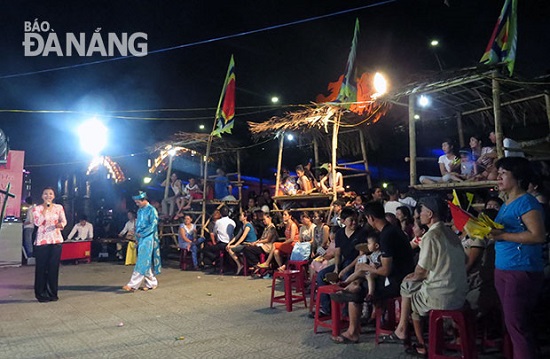Preserving and upholding the values of 'bai choi'
Since April this year, 'bai choi' (singing while acting as playing cards) performances have taken place between 5.00pm and 9.30pm on Saturdays and Sundays on the pavement of Tran Hung Dao at the eastern end of the Rong (Dragon) Bridge. The participation fee is only 20,000 VND per person. This activity has helped to diversify the cultural and entertainment activities along the banks of the Han River.
'Bai choi', a folk game and a traditional Vietnamese art form, has been indispensable in the spiritual lives of residents in the 11 central coast localities from Quang Binh to Binh Thuan provinces, especially at Tet and on other occasions.
 |
| An impressive ‘bai choi’ performance |
This type of traditional stage performing arts is being considered for UNESCO recognition as an intangible world heritage. It encompasses folk card playing and impromptu, sharp, responses by the hosts.
Players sit in 9 to 11 small sheds, where they listen attentively to the host shouting out the name of the card he/she has drawn. To boost the suspense and engagement from the players, the host recites a line from a poem or folk song which contains the card’s name.
At the latest 'bai choi' performance, a visitor from Ho Chi Minh City said that he was very interested in taking numerous photos of the event. He added that this was the first time he had enjoyed such a fascinating type of arts in which there was a close interaction between the host and the players. He added that he was very impressed by the simple but witty lyrics of songs which touch the hearts of the watchers during the show.
Over recent years, ‘bai choi’ has been performed at many local festivals and cultural events. Like other types of traditional Vietnamese stage performing arts, ‘bai choi’ has yet to attract a great deal of attention from local young people. According to the latest survey conducted by the city’s Centre of Cultural Heritage Management, the majority of local ‘bai choi’ lovers are aged 50 - 70.
The Centre’s Director, Mr Ho Tan Tuan, suggested that, apart from maintaining the ‘bai choi’ performances, local relevant agencies should develop specific plans for conserving and upholding the cultural values of this traditional Vietnamese art form over the 2015 - 2020 period.
Special heed should also be paid to introducing ‘bai choi’ to local school pupils, and organising monthly performances in local areas to entertain residents.